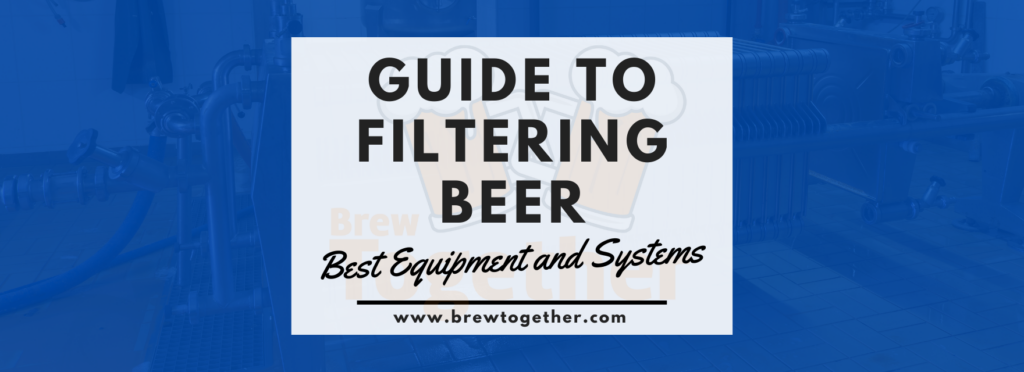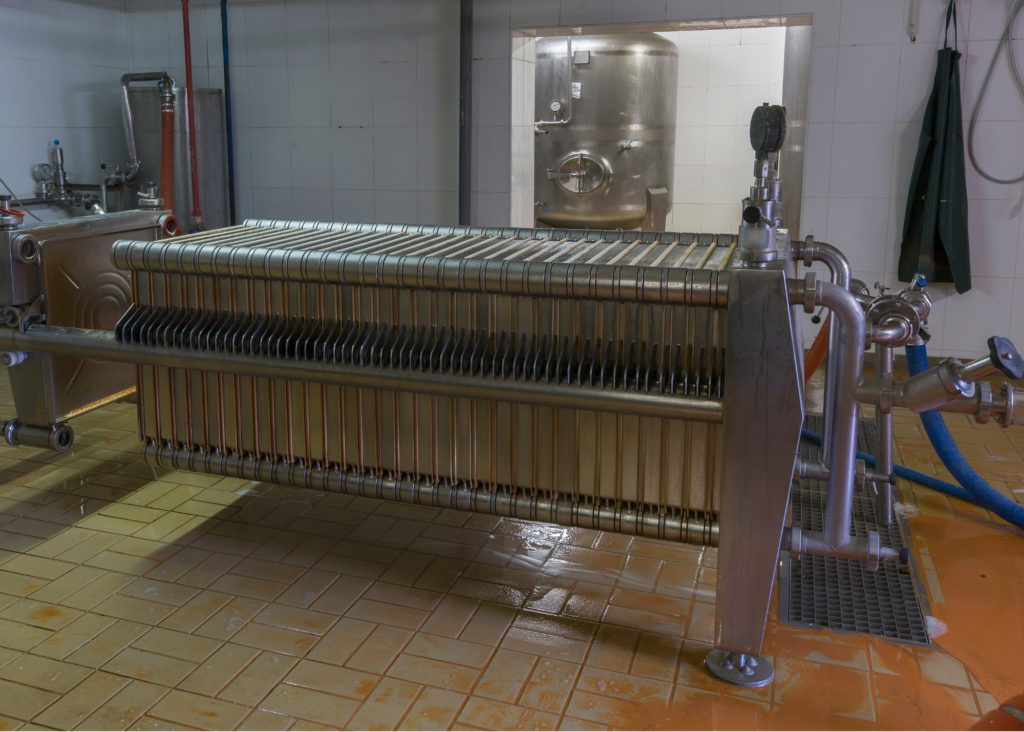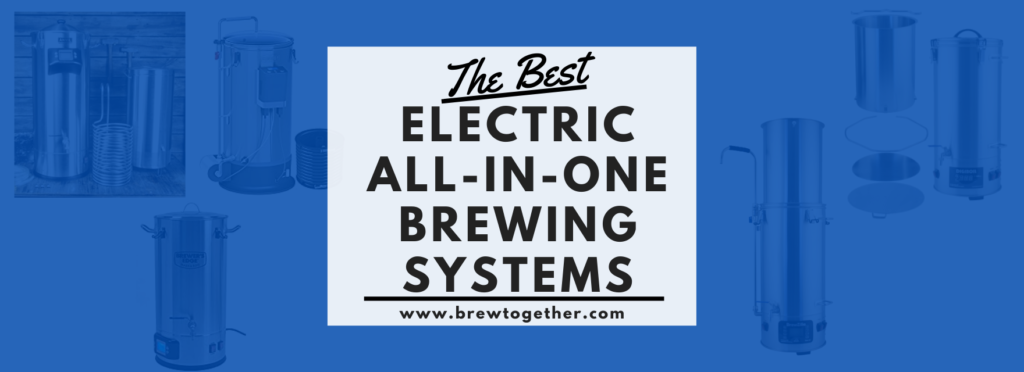Guide to Filtering Beer and the Best Equipment and Systems


The brewing process is a harmonious blend of art and science. From selecting the right ingredients to the final step of kegging or bottling, every phase plays an important role. Among these steps, beer filtration stands out as a pivotal component, ensuring the beer’s quality, clarity, and taste. While most commercial beers are filtered, few homebrewers make filtration a part of the brewing process. The following information will help you understand the intricacies of beer filtration, as well as provide a few recommendations on beer filtration equipment for homebrewers.


The Impact of Yeast and Contaminants
Yeast, while essential for the fermentation process, can cloud the beer if not removed post-fermentation. Unfiltered beer often has a hazy appearance due to residual yeast cells and other particulates. Filtration ensures your beer remains pure, clear, and free from any unwanted elements. The bottom of the beer bottle often tells the tale of the filtering process – the clearer the bottom, the better the filtration.
The Benefits of Filtration
Benefits for Homebrewers
Homebrewers, with their beer kits and starter kits, often seek perfection in every batch. Filtration offers several advantages:
- Enhanced Clarity: No one enjoys a cloudy beer. Filtration, especially using diatomaceous earth and cartridge filters, ensures a crystal-clear brew, enhancing its visual appeal.
- Improved Taste and Aroma: Unwanted particles can alter a beer’s taste. With the right filter medium, like sheet filters or membrane filters, these impurities are removed, preserving the beer’s intended flavor profile.
- Safety and Shelf Life: Filtration not only ensures safety by removing harmful pathogens but also contributes to the life extension of beer, ensuring it remains fresh for longer.
- Consistency and Quality Control: Achieving consistency across batches is crucial. Filtration plays an important role in maintaining beer quality, ensuring each brew is as good as the last.
Benefits for Commercial Breweries
For commercial breweries, the stakes are even higher. With gallons of beer at play, the brewing process needs to adhere to high standards:
- Economic and Quality Advantages: Efficient beer filtration equipment and systems, like frame filters and pressure leaf filters, can lead to reduced product loss and a superior product, boosting profitability.
- Rapid Production and Quality Control: Achieving clarity quickly is essential. Using an advanced beer filtration system, beer stabilization is achieved faster, meaning that commercial beers can be produced faster without compromising on quality.
- Flexibility and Adaptability: Different types of beer require different filtration solutions. Whether it’s a hard seltzer or a traditional ale, modern filtration systems, like cross-flow filtration, can be tailored to suit specific requirements.
Filtration in Homebrewing vs. Commercial Brewing
While both homebrewers and commercial breweries aim for top-notch beer, their filtration needs can differ. Homebrewers, with their beer brewing setups, might opt for simpler filter housings or micron filters. In contrast, a commercial brewery might invest in advanced beer filtration equipment, like DE filters or membrane cartridges, to handle larger volumes.
Types of Beer Filtration Equipment
The filtration process in brewing can be achieved using a variety of filters. Each type of filter serves a specific purpose and is suited for different stages of the brewing process or different scales of production. Here’s a breakdown:
Plate Filters
These filters consist of large plates that are used to trap and remove particles. They are often used in commercial settings due to their ability to handle large volumes of beer. The filter medium, often a sheet or pad called a filtration plate, is placed between the plates, and beer is passed through, leaving impurities behind.There are smaller plate filters available for homebrewers as well.
Cartridge Filters
As the name suggests, these filters use cartridges to remove impurities, and the cartridges can be replaced as needed. They are versatile and can be used in both home brewing and commercial setups. The cartridges can be replaced once they’ve reached their filtering capacity. They come in various micron ratings, allowing brewers to achieve the desired clarity. These are mostly used systems in smaller setups, especially by home brewers, and are often the cheapest system for filtering your beer.
Bag Filters
These are simple filters where beer is passed through a bag, which traps the larger particles. They’re a good option for home brewers looking for an economical solution.
Sheet Filters and Filter Sheets
These work like sieves, using sheets to trap and remove particles. They’re straightforward and effective, especially for homebrew beer. The type of filter sheet can vary based on the desired clarity, with some advanced brewers even opting for a fine filter to achieve crystal clear beer.
Membrane Filters
These are advanced filters that use a membrane to remove particles. The membrane filter, often with a micron filter rating, ensures clearer beer by removing even the tiniest of particulates. They are especially effective in achieving crystal clear beer and are often used as a final filtration step before packaging.
Canister Filters
Similar to cartridge filters but on a larger scale, canister filters are used in commercial settings. They can handle large volumes of beer and are known for their efficiency.
Depth Filters
These filters trap particles within their matrix, rather than on the surface. They can be made from various materials, including ceramic, glass fiber, and polymeric materials. Depth filtration is known for its ability to trap a wide range of particle sizes.
Mechanical Filtration
This involves the mechanical removing of all live yeast through the use of wound filters or canister filters, often found in household water systems. They’re a good idea for those looking to achieve a little cleaner beer without investing in specialized beer filters.
Secondary Fermentation and Cold Crash
While not direct filtration processes, these methods help in settling yeast cells at the bottom of the fermenter. This serves as a type of primary filtration that makes the subsequent filtering process more effective.
Each type of filter has its advantages and considerations. The choice often depends on the scale of brewing, the desired clarity, and the specific requirements of the type of beer being brewed.
Best Beer Filtration Equipment for Homebrewers
For homebrewers, the choice of equipment is vast. From simple plate filters to more advanced systems like DE filters, there’s something for every brewer. Filter size plays a crucial role in determining the clarity of the beer. While smaller filters can remove residual yeast and particulate matter, larger filters are often used as a first stage to remove bulk impurities.
Fining agents like Irish moss and Whirlfloc tablets (sometimes included in a beer kit) are also employed by many home brewers before the main filtration process to aid in settling impurities at the bottom of the bottle.
There are also some great filtration systems for homebrewers. Here are a few good options:
Bouncer Inline Beer Filter
The Bouncer Inline Beer Filter is an innovative tool designed to enhance the clarity and taste of homebrewed beer by effectively filtering out trub, krausen, hops, and proteins. Constructed from durable thermoplastic and T304 stainless steel, this filter is not only built to last but is also capable of withstanding temperatures up to 150°F. Made in the USA, the Bouncer offers a reusable solution for those looking to achieve clearer beer without the need for additives or extended cold crashing.
Its design allows for gravity-fed operation using a standard racking siphon, eliminating the need for additional pressurization or pumping. This simplicity extends to its maintenance, with fewer components to clean and sanitize after use. The filter is compatible with 3/8″ inner diameter siphon tubing, a common size for homebrewers. When using the Bouncer, brewers can position it between the fermenter and keg or between the boil kettle and fermenter. This ensures the removal of unwanted particulates without introducing air. Its efficiency means that brewers can extract more from each batch, avoiding the trub layer and speeding up the beer’s conditioning process. The Bouncer’s design also allows for creative uses, such as infusing flavors from ingredients like orange peels or coffee beans directly into the beer.

Beer Plate Filter Kit
The Beer Plate Filter Kit from MoreBeer is designed to offer homebrewers the same clarity in their brews as commercial breweries and wineries achieve with their large plate filter systems. Priced at $69.99, this kit is tailored for filtering smaller volumes of beer or wine at home. The system operates by using two corny kegs and has a larger surface area than a cartridge filter, ensuring more efficient extraction of yeast and particulates. The kit includes the plate filter, two disposable filter pads, tubing, flare fittings, and two flare beverage ball locks.
The beer or wine is pushed from one keg into the filter housing at a pressure of 5 PSI. It then passes through the filter pads, which should be of the same micron size, and is subsequently pushed into a clean keg. Each filtering session requires two pads, and each set of filter pads can handle approximately 5 gallons of beer. It’s worth noting that these pads are designed for single-use sessions and are not meant to be back flushed or reused. The kit is versatile, suitable for both beer and wine, but the type of pads you choose might vary based on the clarity you aim to achieve.
Beer Filter Kit – 10 in. Canister Filter
The Beer Filter Kit – 10 in. Canister Filter is priced at $69.99 and is designed to streamline the beer filtration process for homebrewers. This kit is set up to be installed inline between two ball lock Cornelius kegs, using CO2 pressure to transfer beer from one keg, through the filter, and into another keg. The primary purpose of this filter is to remove particles down to 1 micron, which is considered fine filtration. This level of filtration ensures that the beer will be clear post-filtration, assuming there’s no starch haze present.
An added advantage of using this filter is that it can significantly speed up the beer conditioning process, allowing brewers to enjoy clear beer in just a few days. The kit includes a 10″ filter housing, a 1 micron 10″ spun poly sediment filter, fittings for connecting to the filter housing, 3 feet of beverage line, clamps, and two beverage out ball lock quick disconnects. It’s worth noting that the spun-polypropylene filters included are disposable and are not designed for multiple uses. However, one filter can be used for multiple kegs. The filter is rated for temperatures up to 125°F.
Commercial Beer Filtration Equipment for Breweries
On the commercial front, the demands are rigorous. Advanced systems like DE filters, membrane filtration setups, and even carbonation systems are essential. With commercial beers, ensuring each beer matches the set point for quality is crucial. The main drawback of some systems is the single use nature of filter materials. Remember that the clarity and quality of your beer are paramount when brewing commercially.
Thank you!
The journey of brewing is filled with nuances. From the styles of beer to the choice of filtration processes, every decision impacts the final product. Filtration, while technical, is an art in its own right. It’s the bridge between a good beer and a great.
If you found this article was helpful, please share it with your friends using the social media share buttons below! We need your help getting the word out about BrewTogether!
Still have questions about beer filtration equipment or brewing your own beer? Leave a comment below or post in the forums! The BrewTogether Community is made up of an awesome group of homebrewers around the world. We are always supportive and happy to help answer your questions about brewing your perfect beer!
If you’re not a member of BrewTogether, we’d love for you to join! BrewTogether is completely free, and signing up is easy! Click here to join! We’d love to have you as a member of the BrewTogether Community!
Now using BrewTogether is easier than ever! Download the FREE BrewTogether Mobile App – available on both the Apple App Store and the Google Play Store! The BrewTogether App is completely free and drastically improves the experience of using BrewTogether on a mobile device.
Affiliate Disclosure: BrewTogether is a participant in the Amazon Services LLC Associates Program, an affiliate advertising program designed to provide a means for us to earn fees by linking to Amazon.com and affiliated sites. BrewTogether is also a participant in an affiliate program with MoreBeer, our favorite online homebrewing equipment/ingredients retailer. Some of the links in this article are affiliate links, which means that if you choose to make a purchase after clicking the link, I will earn a small commission at no additional cost to you. Please feel free to reach out with questions. Thank you for your support!








Responses